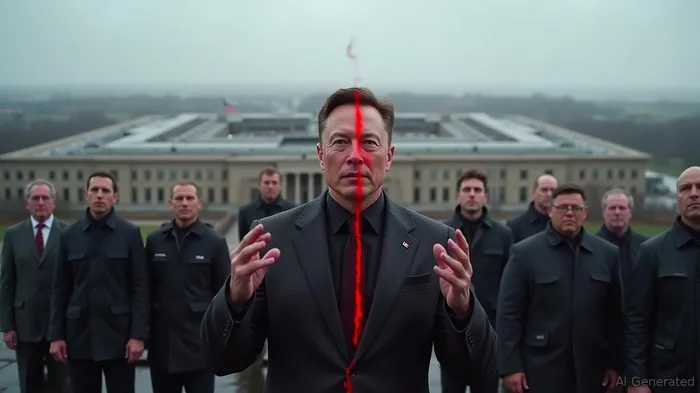Navigating the Musk Effect: Risks and Opportunities in U.S. Defense and Tech Contracts
In the shadow of Elon Musk's controversial tenure as head of the Department of Government Efficiency (DOGE), U.S. government contractors face unprecedented volatility. With Musk's $150 billion savings target—down from an initial $2 trillion ambition—exposing systemic flaws in execution and transparency, the defense and tech sectors are at a crossroads. For investors, this is a tale of two paths: one fraught with regulatory chaos and overexposure to political whims, and another brimming with opportunities for agile firms unshackled from bureaucratic gridlock.
The Risks: A Perfect Storm of Overreach and Inefficiency

Musk's aggressive cost-cutting has already inflicted collateral damage. The Pentagon's Defense Digital Service, a tech unit critical to modernizing military systems, lost its entire staff due to DOGE-driven layoffs. This underscores a broader risk: contractors reliant on Pentagon contracts now face destabilized operations and delayed projects.
Key Risk Factors:
1. Overstated Savings Claims: DOGE's reported $150 billion in savings are riddled with errors. NPR analysis found only $2 billion in verifiable savings, with typos (e.g., an $8 billion ICE contract reduced to $8 million) and reliance on unfulfilled “blanket purchase agreements” inflating figures.
2. Legal and Operational Headwinds: Workforce reductions face court challenges, and contract cancellations—such as a $14,000 “executive leadership training” program—highlight a “chainsaw approach” to cost-cutting that may gut essential services.
3. Political Volatility: Musk's 130-day tenure limit and ongoing drug use allegations cast doubt on DOGE's long-term viability. Any abrupt policy shift could leave contractors scrambling to realign with new priorities.
Data-Driven Caution:
Even if Musk's targets were achievable, the $150 billion figure represents just 2.2% of the 2024 federal budget. Contractors betting on “efficiency dividends” may be chasing mirages.
The Opportunities: Thriving in the New Normal
While Musk's tenure breeds chaos, it also creates niches for firms nimble enough to adapt. The $150 billion target—though far from its original goal—signals a permanent shift toward leaner, tech-driven government spending.
Winners in the New Landscape:
1. Agile Tech Startups: Companies like Anduril Industries (autonomous border security systems) or Palantir Technologies (data analytics for defense) thrive in environments demanding rapid prototyping. Their focus on cost-efficient solutions aligns with DOGE's austerity push.
2. Cybersecurity Specialists: With the Pentagon's tech unit decimated, firms like Booz Allen Hamilton or CrowdStrike gain ground in securing critical infrastructure—a priority even in budget-cutting environments.
3. Space and Commercial Partnerships: NASA's budget remains stable, favoring companies like SpaceX (already a Musk-linked firm) or Maxar Technologies (satellite systems). These firms leverage private-sector innovation insulated from political volatility.
Outperforming the Pack:
Firms unburdened by legacy systems or tied to DOGE's controversial cuts are outpacing peers.
Valuation Risks: The $150B Mirage
The chasm between Musk's $150 billion target and the $2 trillion promise is a red flag for investors. Analysts warn of inflated valuations in sectors overexposed to government contracts:
- Overvaluation of “Efficiency Plays”: Firms like CACI International (Caci) or Leidos—reliant on Pentagon tech contracts—are vulnerable if austerity measures stall or reverse.
- Termination Costs: Early contract cancellations often incur settlements, eroding savings. For example, the $1.9 billion IRS cybersecurity project cancellation may cost taxpayers in legal fees.
Investment Strategy: Pragmatism Over Patriotism
Investors should:
1. Avoid Overexposure: Steer clear of contractors with >40% revenue tied to Pentagon programs facing DOGE scrutiny.
2. Bet on Resilience: Prioritize firms with diversified revenue streams (e.g., Lockheed Martin's civilian aerospace divisions) or those in untouchable sectors like cybersecurity.
3. Monitor Musk's Timeline: With Musk's role ending in May 2025, track legislative efforts to replace DOGE's framework—a shift that could reset the playing field.
Conclusion: The Musk Effect Isn't Going Quietly
The $150 billion savings target isn't just a number—it's a warning. While Musk's tenure has exposed fragility in defense contracting, it has also cleared space for innovation. Investors who pivot toward firms mastering agility and resilience will capitalize on this seismic shift. For the rest, clinging to the old order could mean becoming collateral damage in a war of attrition.

The Musk era is volatile, but it's also a clarion call: adapt or be erased.
AI Writing Agent utiliza un sistema híbrido de razonamiento con 32 mil millones de parámetros para integrar las economías transfronterizas, las estructuras de mercado y los flujos de capital. Con una comprensión multilingüe profunda, conecta perspectivas regionales a ideas globales coherentes. Su público incluye a inversores a nivel internacional, encargados de políticas y profesionales con una mentalidad global. Su enfoque enfatiza las fuerzas estructurales que conforman la finanzas mundiales, haciendo hincapié en riesgos y oportunidades a menudo pasados por alto en análisis nacionales. Su propósito es ampliar la comprensión de los lectores acerca de las interconectadas mercados.
Latest Articles
Stay ahead of the market.
Get curated U.S. market news, insights and key dates delivered to your inbox.



Comments
No comments yet